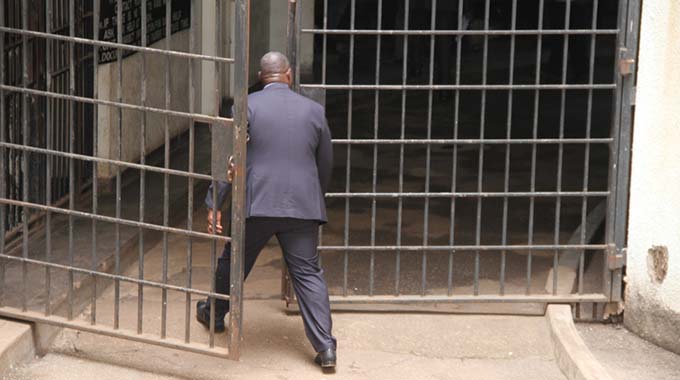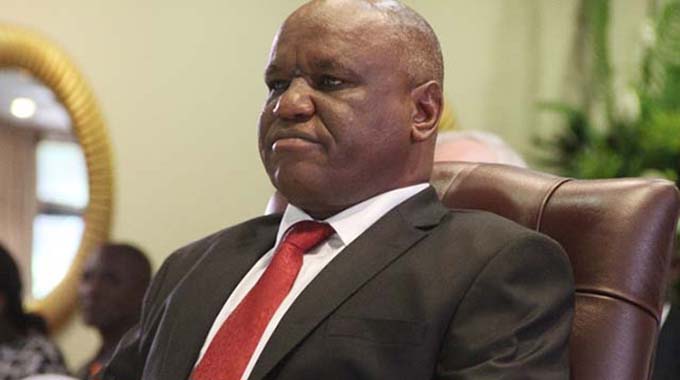ED fight against corruption is real

Nick Mangwana Special Correspondent
This week saw an unprecedented number of high-profile individuals appearing before our courts of law in connection with corruption, giving momentum to Government’s fight against graft.
Given the fact that the tolerance threshold for the malady of abuse of office and corruption had been so low in the country, this is a marked and significant shift, which must inspire confidence in the generality of our people.
Admittedly, there has been cynicism in some quarters as to the sincerity of the exercise, but the nation should rest assured that the fight against corruption is real and that more cases of corruption will be dealt with in the courts, while some procedures and processes are underway to institute further cases that are within the radar.
This will make the following weeks interesting to watch.
His Excellency, President Emmerson Mnangangwa, has already declared zero tolerance to corruption and has used various fora to hammer this home: as the wheels of justice turn, Zimbabwe will see the actualisation of the anti-corruption governance paradigm espoused by President Mnangagwa.
Fighting corruption is one of the key pillars of the Second Republic and President Mnangagwa has stated that his administration’s goal is to build a new Zimbabwe based on transparency, accountability and hard work. He recognises that corruption is one of the major causes of the problems that Zimbabwe faces today necessitating that all cases be investigated and punished in accordance with the laws of the country.
Government has already taken the initiative and established institutions to deal with corruption. This has seen the establishment of Special Anti-Corruption Courts, a new Anti-Corruption Prosecution Unit within the Office of the President and the incorporation of the Public Entities Corporate Governance Act.
Fighting corruption – A global imperative
A clean Government is imperative and a key pillar in achieving Vision 2030 and upper middle income country (UMIC) status. Before we delve into details of this paradigm, we need to demonstrate that this administration’s fight against graft is in line with regional, continental and global standards which require states to institute measures to deal with the scourge.
Zimbabwe, as a responsible member of the international community, adheres to fighting corruption in line with universal principles set out at United Nations, African Union and Sadc regional levels.
The United Nations Convention Against Corruption is a global framework for fighting graft and it has a far-reaching approach and a mandatory character whose provisions make it a unique tool for developing a comprehensive response to a global problem. The convention covers five main areas: preventive measures, criminalisation and law enforcement, international cooperation, asset recovery, and technical assistance and information exchange. The convention covers many different forms of corruption, such as bribery, trading in influence, abuse of functions, and various acts of corruption in the private sector
At continental level, the African Union (AU) Convention on Preventing and Combating Corruption was adopted in 2003. It addresses corruption in the public and private sectors. It represents a consensus on what African countries should do in the areas of prevention, criminalisation, international cooperation and asset recovery. Its provisions criminalise domestic and foreign bribery, diversion of property by public officials, trading in influence, illicit enrichment, money laundering and concealment of property. Earlier in the year, the African Union, during its 30th Assembly of Heads of State and Government in January 2018, launched 2018 as the African Anti-Corruption Year.
President Mnangagwa attended the summit, held under the theme “Winning the Fight aAgainst Corruption: A Sustainable Path to Africa’s Transformation”. Africa also has a variety of instruments aimed at fighting corruption, among others, the African Charter on the values and principles of public service and administration, and the African Charter on the values and principles of decentralisation, local governance and local development.
At regional level, the Sadc Protocol Against Corruption aims to promote and strengthen the development, within each member state, of mechanisms needed to prevent, detect, punish and eradicate corruption in the public and private sectors. The protocol further seeks to facilitate and regulate cooperation in matters of corruption amongst member states and foster development and harmonisation of policies and domestic legislation related to corruption.
The protocol clearly defines “acts of corruption” preventative measures, jurisdiction of member states as well as extradition.
The aims of the protocol are:
(a) to promote the development of anti-corruption mechanisms at the national level
(b) to promote cooperation in the fight against corruption by state parties
(c) To harmonise anti-corruption national legislation in the region
The protocol also, notably, provides a wide set of preventive mechanisms which include:
development of code of conduct for public officials
transparency in public procurement of goods and services
easy access to public information
protection of whistle blowers
establishment of anti-corruption agencies
develop systems of accountability and controls
participation of the media and civil society; and
use of public education and awareness as a way of introducing zero tolerance for corruption.
Zimbabwe relates to these measures and has especially taken steps to adopt them and localise the fight against corruption.
Fighting corruption as an enabler for vision of UMIC
When Zimbabwe adopted the policy of seeking to achieve upper middle income country status by 2030 we set out a number of “New Dispensation Core Values”.
Fighting corruption is one of the issues we identified to be at the centre of achieving UMIC.
Some of the precepts of the anti-corruption drive are transparency, accountability and value for money.
Government is implementing a number of measures on fighting corruption, one of the sources of increased cost of doing business, rent-seeking behaviour and inefficiency on service delivery in both public and private sectors. In the mining sector, there is need for greater transparency and accountability in the management of mineral revenue and Government will improve mineral governance, including adoption of international best practices, benefiting from the Extractive Industry Transparency Initiative (EITI).
The New Government is capacitating the Zimbabwe Anti-Corruption Commission, the police and prosecuting authorities with the requisite skills to investigate and prosecute crimes related to corruption. Similarly, Government is expediting the establishment of a Commercial Crimes Court to fast-track the prosecution of such offenders.
Regarding asset declaration, the administration of President Mnangagwa has set the requirement for Cabinet ministers and senior public servants to declare their assets. Work is also underway to set up anti-corruption courts.
In the corruption fight, Government will fight externalisation of funds, which has seen us institute the Finance Act of 2018, amending the Exchange Control Act by embodying “Amnesty in Respect of Illegally Expatriated Property” to address indiscipline which had seen many individuals and legal persons moving assets offshore.
Government has also enacted the Public Procurement and Disposal of Public Assets Act, and subsequently established the Procurement Regulatory Authority of Zimbabwe which decentralises the procurement process to public entities to ensure that public procurement and disposal of assets is effected in a manner that is transparent, cost-effective and competitive. Additionally, the Public Entities Corporate Governance Act has also been enacted, to improve the internal management structures of parastatals and other public entities, which had been characterised by malpractices and corruption.
Looking the beast in the eye
Cases of corruption and serious fraud are complex and technical by nature. This requires us to look the beast in the eye. Experiences elsewhere make this relation.
In the United Kingdom where trials are conducted before a jury, there have been efforts to make serious fraud cases be heard without a jury. This was because it was felt that the complexity of the cases was muddling the jury up. In Zimbabwe the failure to convict has been seen to suggest either a contaminated system or a skills deficit. The latter is especially poignant.
Is the current ordinary judiciary training adequate to deal with the complex corruption cases that the courts are seized with?
On the other hand, are our courts endowed with enough integrity to tackle corruption? We are positive that our courts are capacitated with both talent and integrity.
Soon, Government will inculcate the right measures of awareness, focus and ethic that will usher a sea-change in how the judiciary conducts itself in line with President Mnangagwa’s stance on corruption.
The movement in the fight against corruption – as seen in this week’s developments – points to a positive trajectory.
The universally accepted truism is that successful conviction and incarceration of high-profile individuals will send the right message to all that this Government means business when it comes to zero tolerance to corruption. Of course, the arrests have also sent the message that impunity no longer works. But nothing sends a more solid message than arrest, conviction followed by seizure and confiscation of assets.
There is also nothing that says we should not be able to put in place legislation that allows the seizure of unexplained wealth even if there is no conviction. The burden to prove a criminal case beyond reasonable doubt may prove too steep a summit to climb but if we are not going to be a hub for organised crime, then people should be able to explain their wealth. Failure should be assumed to mean it’s ill-gotten, and is seized and converted to public use.
Actions of such nature will enhance public confidence and kill this apathy that seems to be creeping in and dampening public morale due to lack of convictions. It also diminishes the quality of public service and our democracy. Failure to successfully prosecute high-level corruption has the effect of weakening our institutions and distorting the rule of law. There is a need to re-establish public trust. And to recover trust and strengthen public institutions the bad guys must go to prison. When high-profile people are arrested and publicly arraigned this must yield tangible results in order to galvanise public will and deter others.
It follows that for each mega arrest, we shall see a mega conviction or otherwise, upon a credible justice process.
Zimbabwe has a reform-minded President championing the fight against criminal abuse of office and corruption.
Entrenched corruption must face both social and legal opposition otherwise it continues to affect the effectiveness of our Government. The most visible statement of “zero tolerance to corruption” is a criminal conviction – and we are confident that this will soon be bold enough.
Nick Mangwana is the Permanent Secretary in the Ministry of Media, Publicity and Broadcasting Services









Comments